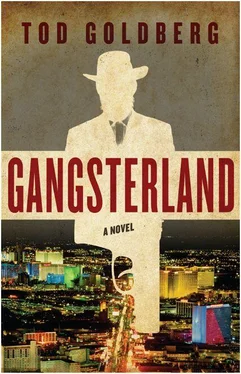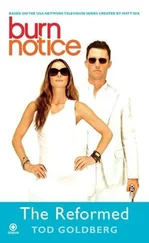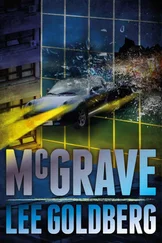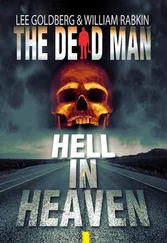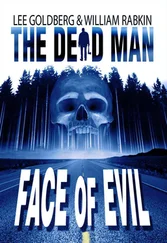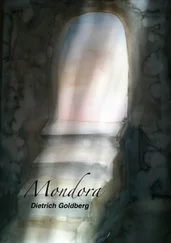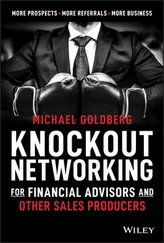While he jogged, he’d talk back to the tapes, which meant he did little more at first than nod at the other joggers he encountered, or the people rolling into their homes after the conclusion of their 9 p.m.–5 a.m. shifts at the hotel (or casino or strip club or wedding chapel or wherever else all these people seemed to flow in from), the neighborhood as busy at 5 a.m. as it was at 5 p.m. The town kept meth hours, which was unnerving. David had spent so much time over the last fifteen years doing work in the dark that he’d become comfortable alone in the shadows. Here, everyone moved under the cover of darkness. It made David feel unbalanced. Or more unbalanced, anyway.
So he shouldn’t have been surprised when at five thirty in the morning on the first day of Hanukkah, he came around the corner of Pebble Beach Way, heading toward Sawgrass Street, and found a man in a suit standing there. He was about David’s size — a little over six foot, fit, but not overly so — but looked to be a decade up on David in age. The first thing David thought was that he was a fed. He reminded himself he wasn’t supposed to be paranoid, that no one in Las Vegas was looking for him, and that he didn’t look like Sal anymore, a fact that surprised David every time he looked in the mirror, particularly now that he had a full beard speckled with bits of gray.
Still, his first inclination was to snap the guy’s neck and keep moving. There was something wrong with this idea, David now understood, even if it seemed simpler than whatever was going to come next.
The man approached him without any trepidation, already talking, though David couldn’t hear him over the cassette he was listening to. The man didn’t appear to have a gun, or handcuffs, or any kind of walkie-talkie or a cell phone, and was standing next to an idling Mercedes. Not even the best fed got to roll in a Mercedes, so David removed his headphones and tried to look surprised and not murderous while still maintaining enough distance that, if need be, he could act on whatever volition he had. Not paranoid. But not a fucking pussy, either.
“Sorry, sorry,” the man said. “I didn’t see you had phones on.” He extended his hand, and David shook it. “Jerry Ford. Like the president, except I’ve got all my hair, at least for now.”
David didn’t respond. He was trying to figure out why this man had been lying in wait for him. He looked vaguely familiar in the same way people in dreams look vaguely familiar.
“I live right here,” Jerry said, when the pause became awkward, “and have been meaning to come out and chat with you. Seen you every morning and just didn’t make the connection before. Sort of expected the whole mishegas with the crap hanging off of your clothes and whatnot.”
The butter-yellow house was three blocks from David’s, and the Mercedes — a butter-yellow convertible — registered, too.
“Not crap ,” Jerry kept on, “never crap , God, but, what do you call that stuff that the Hasids wear around their waist?”
“ Tzitzit, ” David said. Rabbi Kales had warned him that once people knew he was a rabbi, they’d have all kinds of questions, the pressure of which made David stay up every night and, even before the jogging, wake up early every morning. It was the same schedule he kept back home, anyway, just with more reading.
Jerry snapped his fingers. “That’s it, that’s it,” he said. “I don’t know why I was expecting the full black getup with the. . how do you pronounce that again?”
“ Sit-sis ,” David said.
“Oh, like you’re telling your sister to take a seat, right?”
“Right.” David wasn’t positive this was correct. He was positive, however, that he had the authority to be wrong and not be challenged, which he rather liked.
“I don’t know why I thought that,” Jerry said. “Rabbi Gottlieb, Rabbi Kales, they’re both like you, right?”
“I never knew him,” David said. “Rabbi Gottlieb.”
“Helluva nice guy,” Jerry said, in a way that made David doubt the sentiment. “Never took him for a drunk. Never took him to be much of a boater, either, but then who knows, right? Private lives of rabbis must be a thing of great mystery.”
“I’m sorry,” David said. That was something Rabbi Kales had imparted to him lately: Start conversations by saying I’m sorry , and people will assume you’re apologizing for being very busy, even when you’re just trying to get away from them. Then just say but , and if you’re lucky, the person on the other end of the conversation will get to their point or leave you be.
“No, no, I’m sorry, you’re a busy man, I’m sure,” Jerry said. “And I just ambushed you on your run like some kind of criminal. I keep odd hours, like you, and thought this might be the one chance I had to chat with you for a minute, finish a business conversation I never got to finish with Rabbi Gottlieb.” Jerry fished a business card out of his suit jacket pocket and handed it to David. “I own my own biomedical business, and I’ve been trying to get into a conversation with the funeral home at the temple, where, it should be noted, I am a member in excellent standing.”
David stared at the card trying to make sense of what was happening. He couldn’t. “I’m sorry,” David said again, and, tried to hand Jerry his card back.
“No, no, hold on to it,” Jerry said. “I’m not trying to sell you anything. Rabbi Gottlieb and I talked about this at some length before his accident, and then Rabbi Kales wouldn’t take any of my calls. I tried to go through the rabbi’s son-in-law, and he gave me the runaround, said he was just a fund-raiser, which I totally get. Need to keep business and family separate, right?”
“I haven’t gotten to know Mr. Savone very well,” David said, “but the Talmud tells us that business is a test of our ethics. And I know Mr. Savone is an ethical man.”
“No argument,” Jerry said. “My business is in tissue, and tissue doesn’t discriminate. We do a lot of work with the dental school at UNLV and the med school out in Reno, plus private medical interests around Nevada, little bit in Oregon, trying to move out into Utah, but the Mormons are a golem , am I right?”
Jerry stared at David like he was looking for some kind of approval. It was one of the weird things David had noticed about the Jews. They wouldn’t always come right out and tell you they were Jews once they found out you were a rabbi, or even just with strangers they thought were also Jews; instead they’d drop these code words into the conversation, these bits of Yiddish, just to let you know on the sly that they were in the tribe. It was like how the wannabe gangsters used to talk, every other word was whacked or respect or some shit they picked up watching The Godfather , like everyone was running around talking about going to the mattresses.
“You shall inquire and make search and ask diligently,” David said. He’d read that in the Talmud, and it sounded like something Rabbi Kales might roll out without explanation, so he gave it a spin.
“I get that, I get that,” Jerry said. “Thing is, I’m trying to develop a partnership with a funeral home or two locally for those people who want to donate their tissue, and, quite honestly, we have some of the cleanest bodies around. Even the old ones live pretty clean, right?”
“I’m sorry, but,” David said.
“No, no, I understand. It’s not pleasant conversation. But, for our people , you understand, this is a great opportunity to give back to the local community. And, of course, there are rules about this stuff. The temple would be compensated. That was the thing Rabbi Gottlieb and I were talking about, and he just couldn’t wrap his mind around Rabbi Kales ever getting into it. But I’m seeing you out here running every day, and I’m seeing a sophisticated young man, who, I understand, has the rabbi’s ear now. And I’m thinking, you know, maybe there’s a better chance for a symbiotic relationship to develop here.” Jerry paused, as if trying to find that final bit of noninformation that might interest David, not knowing he’d already stumbled through it when he mentioned some form of compensation. “It would be a mitzvah , is what I’m saying. Good for the Jews.”
Читать дальше
